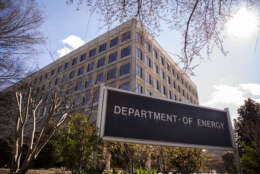Tom Temin
-
The war in Ukraine, and to some extent Israel, have drained away U.S. weapons and ammunition stockpiles. Numerous studies have cited a shortage of shells, missiles and launch platforms, as well as whether the industrial supply chain and the military's own organic supply chain have the capacity to sustain the demand. For one informed view, the Federal Drive with Tom Temin talked with Al Abramson, the Vice President of Strategic Engagement with the National Armaments Consortium and a retired U.S. Army brigadier general.
December 14, 2023 -
With the markets going stong, more TSP millionaires emerge. Here's how you can join their ranks.
December 14, 2023 -
Even in today's inflationary times, the word millionaire has a certain cachet. With a little self discipline and the power of compound interest, millionaire status is available to federal employees who make wise use of the Thrift Savings Plan.
December 14, 2023 -
The U.S. Agency for International Development (USAID) is known for operating around the globe. Now it has a geospatial strategy it hopes will improve the decision-making and, ultimately, the effectiveness of its aid programs. For details, the Federal Drive with Tom Temin spoke with Carrie, Stokes, USAID's Chief Geographer.
December 14, 2023 -
In today's Federal Newscast: The Office of Personnel Management serves up a few onboarding reminders. The 2024 National Defense Authorization Act clears its latest hurdle. And Sen. Joni Ernst wants feds fired who get convicted of a sexual assault.
December 14, 2023 -
Education performance in developed countries, and in the United States, is a mixed bag. That is according to the latest Programme for International Student Assessment (PISA), a periodic project of the Organization for Economic Cooperation and Development. In the U.S., math performance by 15-year-olds was worse than in 2018, among the lowest ever. Reading and science held steady. For analysis of what the results mean, the Federal Drive with Tom Temin spoke with Ryan Tauriainen, the Executive Director of Teach For America's D.C. region.
December 13, 2023 -
The competition for strategic advantage in economic and military affairs depends more and more on critical materials. Now the Energy Department has launched an initiative it calls the Critical Materials Collaborative. Among its goals, to accelerate a domestic supply chain for critical materials. For more, the Federal Drive with Tom Temin talked with the Senior Technology Manager for the Energy Department's Advanced Materials and Manufacturing Technologies Office, Helena Khazdozian.
December 13, 2023 -
The closer NASA gets to returning to the moon, the farther away the moon seems to move. Contractors on the Artemis 3 project are having trouble with some basic items, like the spacesuits astronauts would need and the lunar lander itself. The Government Accountability Office has found that NASA may be too ambitious in its schedule for the initial launch.
December 13, 2023 -
On today's Federal Newscast: . Harry Coker has been confirmed as the next national cyber director. The Bureau of Prisons tries to deal with a 40% shortage of correctional officers nationwide. And as plans for a new FBI headquarters chug along, the old building falls apart.
December 13, 2023 -
The Navy is not quite certain how many ships and submarines it wants to build over the next few decades. In fact, it has offered three alternative plans to Congress, with varying timelines and price tags. For analysis, the Federal Drive with Tom Temin turned to the Senior Analyst for Naval Forces at the Congressional Budget Office, Eric Labs.
December 12, 2023 -
It looks like Congress has managed to get the National Defense Authorization law done before December 31. As always, the bill is chock full of items federal contractors should pay attention to.
December 12, 2023 -
Tis the season to be jolly. But military service members and veterans often experience a spike in depression or post traumatic stress disorder -- even suicide -- this time of year. For some of the warning signs and how you can help, we turn to the Director of Admissions at Warriors Heart, Michael O'Dell.
December 12, 2023 -
In today's Federal Newscast: The Small Business Administration is redefining small. The Cybersecurity and Infrastructure Security Agency is rolling out a new cybersecurity tool for agencies. And DARPA makes plans to build a booming economy on the moon.
December 12, 2023 -
As the artificial intelligence phenomenon rolls on, the question emerges: What are the cybersecurity-attack implications of AI? Now Carnegie Mellon University's Software Engineering Institute has formed a team called the Artificial Intelligence Security Incident Response Team. It's working with sponsors in the Defense and Homeland Security Departments. For more, the Federal Drive with Tom Temin spoke with the Director of the CERT division of the Software Engineering Institute, Greg Touhill.
December 11, 2023 -
It's down to the wire for the 2024 National Defense Authorization Act, over which the House and Senate are still working out differences. This as Congress prepares to depart for the holidays.
December 11, 2023















